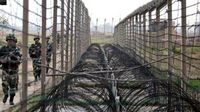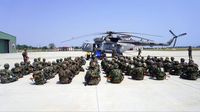In the wake of the deadly terror attack in Pahalgam that claimed the lives of 26 innocent civilians on April 22, tensions between India and Pakistan have reached a new high. The brutal incident, which took place in Jammu and Kashmir, has triggered heightened security responses across the nation. Taking serious note of the escalating threat, the Ministry of Home Affairs (MHA) has issued directives to several states, urging them to conduct large-scale civil defence mock drills on May 7. These drills are aimed at assessing the country's preparedness in case of a hostile attack and at the same time raising awareness among the public.
Meanwhile, United Nations Secretary General Antonio Guterres has called for "maximum restraint," saying that a "military solution is no solution." Condemning the attack, Guterres expressed grief over the relation between both countries reaching a "boiling" point.
The nationwide mock drill will be conducted in key states including Delhi, Uttar Pradesh, Odisha, and West Bengal. This initiative follows the April 22 terror attack in Jammu and Kashmir’s Pahalgam, where 26 people lost their lives, prompting heightened security measures across the country. "We are reviewing preparedness. Loop holes to be rectified have been identified," a National Disaster Management Authority (NDMA) official said following a high-level meeting at the MHA.
Security has been significantly intensified in Jammu and Kashmir's Poonch and Rajouri districts following the recent surge in tensions with Pakistan, triggered by the deadly terror attack in Pahalgam. Fresh visuals from the region show security forces actively checking vehicles and conducting thorough inspections across key routes. Pakistani forces continued to break the ceasefire agreement along the Line of Control (LoC) in Jammu and Kashmir by opening fire without provocation; during the night of May 5–6, Pakistani troops fired small arms across the LoC in areas opposite Kupwara, Baramulla, Poonch, Rajouri, Mendhar, Naushera, Sunderbani, and Akhnoor.
In response, the Indian Army gave a strong and calibrated retaliation. This marks the 12th night in a row that Pakistan has violated the ceasefire amid escalating tensions between the two countries. The latest round of firing further weakens the ceasefire deal made in February 2021, which is now seen as largely ineffective due to Pakistan’s repeated violations along the 740-kilometre LoC.
In a bold move following the Pahalgam terror attack, India had suspended the Indus Waters Treaty — a decades-old water-sharing pact with Pakistan. This decision has triggered alarm across the region, with experts warning that climate stress is turning South Asia’s rivers into tools of political pressure. Signed in 1960 with World Bank mediation, the treaty had been seen as a rare symbol of cooperation. But critics say the agreement is now under threat — not just from terrorism and politics, but from melting glaciers and erratic river flows due to climate change.
For Pakistan, heavily dependent on the Indus and its western tributaries for drinking water, agriculture, and hydropower, India’s move is a major blow. It increases control over upstream waters. Pakistan has already taken the issue to international forums like the UN. Many argue that this isn’t just a bilateral conflict anymore — it’s a global climate justice issue. As one farmer in Punjab put it: "If the river goes, we go too." This could mark the beginning of a larger battle — not just over water, but over survival in a warming world.
In light of heightened tensions between India and Pakistan, the Union Ministry of Home Affairs has directed a large-scale civil defence mock drill across 244 designated districts on May 7. The exercise aims to strengthen emergency preparedness and enhance coordination among local authorities. The nationwide drill will be conducted in key states such as Delhi, Uttar Pradesh, Odisha, and West Bengal. The ministry has emphasized the importance of ensuring "effective civil defence" through these drills. The initiative is being seen as a proactive measure to assess the country’s readiness in the face of any unforeseen situation.
As part of the preparations, air raid sirens will sound across major cities, and bomb squads and sniffer dogs may be seen patrolling public areas. Authorities have urged civilians to remain vigilant and cooperate with security forces during the drills.
In a significant move to enhance preparedness for emergency situations, a crucial meeting was held in Amritsar with senior officials from the District Administration, Air Force, Civil Defence, Amritsar Police, and the Fire Department. The meeting discussed a coordinated response to possible crisis scenarios, with an emphasis on efficiency and speed. A mock drill will be held in Amritsar aimed at testing the rapid response times of various agencies in the event of an attack.
In a show of solidarity, former Rajasthan Chief Minister Ashok Gehlot stated that the entire country stands united with the government in the wake of the Pahalgam terror attack. He emphasized that Prime Minister Narendra Modi and Defence Minister Rajnath Singh should have complete freedom to take any decisions needed in response to the attack. This sentiment echoes across the political spectrum as leaders from various parties have expressed their support for the government's measures to ensure national security.
As the nation gears up for the civil defence drills, the Indian Air Force is also set to conduct a two-day mega military exercise along the border with Pakistan from May 7, involving all frontline fighter jets, including Rafale, Su-30, and Jaguar aircraft. This military readiness is part of India's strategy to counter potential threats and maintain security in the region.
With the backdrop of rising tensions, the Indian government is taking steps to ensure that citizens are prepared for any eventuality. The nationwide mock drills are not just a test of emergency protocols but also a reminder of the ongoing challenges faced by the nation in the context of regional security.
In conclusion, the situation remains fluid as both nations navigate through these turbulent times. The upcoming civil defence drills on May 7 will serve as a critical test of India's preparedness in the face of evolving threats, while the international community watches closely for any signs of de-escalation or further conflict.






